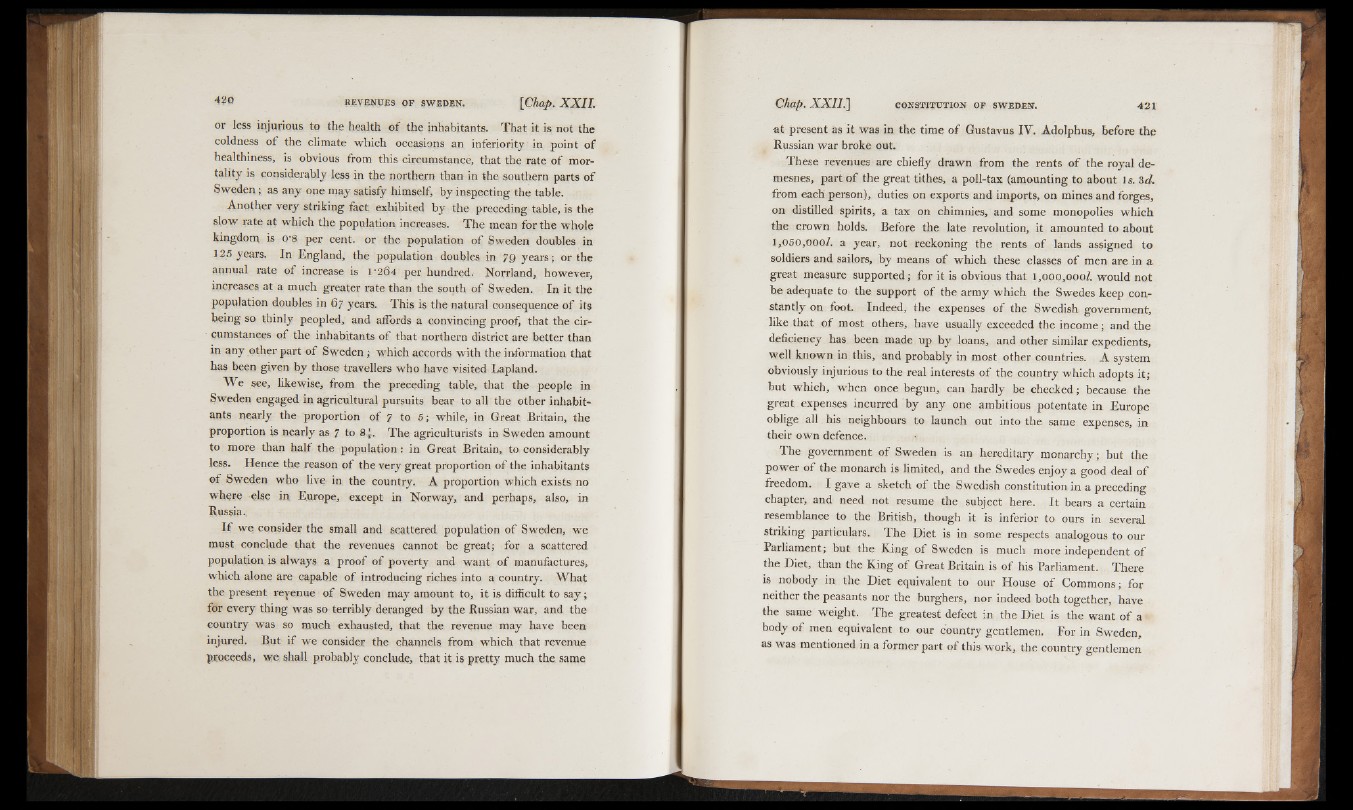
or less injurious to the health of the inhabitants. That it is not the
coldness o f the climate which occasions an inferiority in point of
healthiness, is obvious from this circumstance, that the rate o f mortality
is considerably less in the northern than in the southern parts of
Sweden; as any one may satisfy himself, by inspecting the table.
Another very striking fact exhibited by the preceding table, is the
slow rate at which the population increases. The mean for the whole
kingdom, is 0-8 per cent, or the population o f Sweden doubles in
125 years. In England, the population doubles in 79 years; or the
annual rate o f increase is 1*264 per hundred. Norrland, however,
increases at a much greater rate than the south o f Sweden. In it the
population doubles in 67 years. This is the natural consequence of its
being so thinly peopled, and affords a convincing proof, that the circumstances
o f the inhabitants of that northern district are better than
in any other part o f Sweden; which accords with the information that
has been given by those travellers who have visited Lapland.
W e see, likewise, from the preceding table, that the people in
Sweden engaged in agricultural pursuits bear to all the other inhabitants
nearly the proportion of 7 to 5 ; while, in Great Britain, the
proportion is nearly as 7 to S-j. The agriculturists in Sweden amount
to more than half the population : in Great Britain, to considerably
less. Hence the reason of the very great proportion of the inhabitants
o f Sweden who live in the country. A proportion which exists no
where else in E.urope, except in Norway, and perhaps, also, in
Russia,
I f we. consider the small and scattered population o f Sweden, we
must conclude that the revenues cannot be great; for a scattered
population is always a proof o f poverty and want of manufactures,
which alone are capable o f introducing riches into a country. What
the present reyenue o f Sweden may amount to, it is difficult to say;
for every thing was so terribly deranged by the Russian war, and the
country was so much exhausted, that the revenue may have been
injured. But if we consider the channels from which that revenue,
proceeds, we shall probably conclude, that it is pretty much the same
at present as it was in the time o f Gustavus IY. Adolphus, before the
Russian war broke out.
These revenues are chiefly drawn from the rents o f the royal demesnes,
part of the great tithes, a poll-tax (amounting to about 1 s. 3d.
from each person), duties on exports and imports, on mines and forges,
on distilled spirits, a tax on chimnies, and some monopolies which
the crown holds. Before the late revolution, it amounted to about
1,050,000/. a year, not reckoning the rents of lands assigned to
soldiers and sailors, by means of which these classes o f men are in a
great measure supported; for it is obvious that 1 ,000,000/. would not
be adequate to the support o f the army which the Swedes keep constantly
on foot. Indeed, the expenses of the Swedish government,
like that o f most others, have usually exceeded the income; and the
deficiency has been made up by loans, and other similar expedients,
well known in this, and probably in most other countries. A system
obviously injurious to the real interests o f the country which adopts it;
but which, when once begun, can hardly be checked; because the
great expenses incurred by any one ambitious potentate in Europe
oblige all his neighbours to launch out into the same expenses, in
their own defence.
The government o f Sweden is an hereditary monarchy; but the
power o f the monarch is limited, and the Swedes enjoy a good deal of
freedom. I gave a sketch of the Swedish constitution in a preceding
chapter, and need not resume the subject here. It bears a certain
resemblance to the British, though it is inferior to ours in several
striking particulars. The Diet is in some respects analogous to our
Parliament; but the King of Sweden is much more independent of
the Diet, than the King of Great Britain is of his Parliament. There
is nobody in the Diet equivalent to our House o f Commons; for
neither the peasants nor the burghers, nor indeed both together, have
the same weight. The greatest defect in the Diet is the want o f a |
body o f men equivalent to our country gentlemen. For in Sweden,
as was mentioned in a former part of this wnrk, the country gentlemen